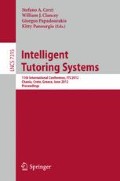Abstract
One of the approaches that has demonstrated by far its efficiency as a tutorial strategy in problem solving learning environments is the Constraint-Based Modeling (CBM). In existing works it has been combined with a data-driven technique for automatic assessment, the Item Response Theory (IRT). The result is a well-founded model for assessing students while solving problems. In this paper a novel technique for studying quality of constraints for this type of assessment is presented. It has been tested with two new systems, an independent component for assessment that implements CBM with IRT, which provides assessment to a new problem solving environment developed to assess the students’ skills in decision-making in project investments. The results of testing our approach and the application of these two systems with undergraduate students are also discussed in this paper.
Access this chapter
Tax calculation will be finalised at checkout
Purchases are for personal use only
Preview
Unable to display preview. Download preview PDF.
References
Mitrovic, A., Martin, B., Suraweera, P.: Intelligent Tutors for All: The Constraint-Based Approach. IEEE Intelligent Systems 22, 38–45 (2007)
Mitrovic, A., Koedinger, K.R., Martin, B.: A comparative analysis of cognitive tutoring and constraint-based modeling. In: User Modeling, pp. 313–322 (2003)
Mitrović, A., Suraweera, P., Martin, B., Zakharov, K., Milik, N., Holland, J.: Authoring Constraint-Based Tutors in ASPIRE. In: Ikeda, M., Ashley, K.D., Chan, T.-W. (eds.) ITS 2006. LNCS, vol. 4053, pp. 41–50. Springer, Heidelberg (2006)
Gálvez, J., Guzmán, E., Conejo, R., Millán, E.: Student Knowledge Diagnosis Using Item Response Theory and Constraint-Based Modeling. In: The 14th International Conference on Artificial Intelligence in Education, vol. 200, pp. 291–298 (2009)
Gálvez, J., Guzmán, E., Conejo, R.: Data-Driven Student Knowledge Assessment through Ill-Defined Procedural Tasks. In: Meseguer, P., Mandow, L., Gasca, R.M. (eds.) CAEPIA 2009. LNCS(LNAI), vol. 5988, pp. 233–241. Springer, Heidelberg (2010)
Ohlsson, S.: Constraint-based student modeling. In: Student Modeling: the Key to Individualized Knowledge-based Instruction, pp. 167–189 (1994)
Thurstone, L.L.: A method of scaling psychological and educational tests. Journal of Educational Psychology 16, 433–451 (1925)
Martin, B., Mitrović, A.: Using Learning Curves to Mine Student Models. In: Ardissono, L., Brna, P., Mitrović, A. (eds.) UM 2005. LNCS (LNAI), vol. 3538, pp. 79–88. Springer, Heidelberg (2005)
Martin, B., Mitrović, A.: The Effect of Adapting Feedback Generality in ITS. In: Wade, V.P., Ashman, H., Smyth, B. (eds.) AH 2006. LNCS, vol. 4018, pp. 192–202. Springer, Heidelberg (2006)
Birnbaum, A.: Some latent trait models and their use in inferring an examinee’s ability. In: Statistical Theories of Mental Test Scores. Addison-Wesley, Reading (1968)
Hambleton, R.K., Swaminathan, H., Rogers, H.J.: Fundamentals of Item Response Theory. Sage Publications, Inc., Thousand Oaks (1991)
Guzmán, E., Conejo, R., Pérez-de-la-Cruz, J.L.: Improving Student Performance using Self-Assessment Tests. IEEE Intelligent Systems 22, 46–52 (2007)
DEDALO project, Assessment and Learning of Mathematics (January 23, 2012), http://dedalo.lcc.uma.es
Khan, M.Y.: Theory & Problems in Financial Management. McGraw Hill Higher Education, Boston (1993)
Sweller, J., van Merrienboer, J., Pass, F.: Cognitive architecture and instructional design. Educational Psychology Review 10(3), 251–296 (1998)
Gálvez, J., Guzmán, E., Conejo, R.: A SOA-Based Framework for Constructing Problem Solving Environments. In: ICALT 2008, pp. 126–127 (2008)
Mitrovic, A., Weerasinghe, A.: Revisiting ill-definedness and the consequences for ITSs. In: 14th International Conference on Artificial Intelligence in Education, pp. 375–382 (2009)
Author information
Authors and Affiliations
Editor information
Editors and Affiliations
Rights and permissions
Copyright information
© 2012 Springer-Verlag Berlin Heidelberg
About this paper
Cite this paper
Galvez Cordero, J., Guzman De Los Riscos, E., Conejo Muñoz, R. (2012). Exploring Quality of Constraints for Assessment in Problem Solving Environments. In: Cerri, S.A., Clancey, W.J., Papadourakis, G., Panourgia, K. (eds) Intelligent Tutoring Systems. ITS 2012. Lecture Notes in Computer Science, vol 7315. Springer, Berlin, Heidelberg. https://doi.org/10.1007/978-3-642-30950-2_41
Download citation
DOI: https://doi.org/10.1007/978-3-642-30950-2_41
Publisher Name: Springer, Berlin, Heidelberg
Print ISBN: 978-3-642-30949-6
Online ISBN: 978-3-642-30950-2
eBook Packages: Computer ScienceComputer Science (R0)

